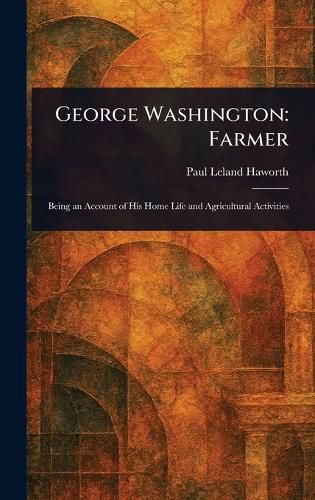Readings Newsletter
Become a Readings Member to make your shopping experience even easier.
Sign in or sign up for free!
You’re not far away from qualifying for FREE standard shipping within Australia
You’ve qualified for FREE standard shipping within Australia
The cart is loading…






This title is printed to order. This book may have been self-published. If so, we cannot guarantee the quality of the content. In the main most books will have gone through the editing process however some may not. We therefore suggest that you be aware of this before ordering this book. If in doubt check either the author or publisher’s details as we are unable to accept any returns unless they are faulty. Please contact us if you have any questions.
"George Washington: Farmer, Being an Account of His Home Life and Agricultural Activities" by Paul Leland Haworth offers a fascinating glimpse into the life of one of America's founding fathers beyond the battlefield and political stage. This meticulously researched account delves into Washington's passion for agriculture and his dedication to Mount Vernon, his beloved estate.
Explore the daily routines, challenges, and innovations of plantation life in Revolutionary-era America through the eyes of its most prominent citizen. Discover Washington's meticulous approach to farming, his experiments in crop rotation, and his vision for a self-sustaining agricultural enterprise.
More than just a biography, this book provides a unique perspective on George Washington, revealing his deep connection to the land and his commitment to building a thriving agricultural community. A compelling read for anyone interested in the American Revolution, early American history, and the story of Mount Vernon.
This work has been selected by scholars as being culturally important, and is part of the knowledge base of civilization as we know it.
This work is in the public domain in the United States of America, and possibly other nations. Within the United States, you may freely copy and distribute this work, as no entity (individual or corporate) has a copyright on the body of the work.
Scholars believe, and we concur, that this work is important enough to be preserved, reproduced, and made generally available to the public. We appreciate your support of the preservation process, and thank you for being an important part of keeping this knowledge alive and relevant.
$9.00 standard shipping within Australia
FREE standard shipping within Australia for orders over $100.00
Express & International shipping calculated at checkout
Stock availability can be subject to change without notice. We recommend calling the shop or contacting our online team to check availability of low stock items. Please see our Shopping Online page for more details.
This title is printed to order. This book may have been self-published. If so, we cannot guarantee the quality of the content. In the main most books will have gone through the editing process however some may not. We therefore suggest that you be aware of this before ordering this book. If in doubt check either the author or publisher’s details as we are unable to accept any returns unless they are faulty. Please contact us if you have any questions.
"George Washington: Farmer, Being an Account of His Home Life and Agricultural Activities" by Paul Leland Haworth offers a fascinating glimpse into the life of one of America's founding fathers beyond the battlefield and political stage. This meticulously researched account delves into Washington's passion for agriculture and his dedication to Mount Vernon, his beloved estate.
Explore the daily routines, challenges, and innovations of plantation life in Revolutionary-era America through the eyes of its most prominent citizen. Discover Washington's meticulous approach to farming, his experiments in crop rotation, and his vision for a self-sustaining agricultural enterprise.
More than just a biography, this book provides a unique perspective on George Washington, revealing his deep connection to the land and his commitment to building a thriving agricultural community. A compelling read for anyone interested in the American Revolution, early American history, and the story of Mount Vernon.
This work has been selected by scholars as being culturally important, and is part of the knowledge base of civilization as we know it.
This work is in the public domain in the United States of America, and possibly other nations. Within the United States, you may freely copy and distribute this work, as no entity (individual or corporate) has a copyright on the body of the work.
Scholars believe, and we concur, that this work is important enough to be preserved, reproduced, and made generally available to the public. We appreciate your support of the preservation process, and thank you for being an important part of keeping this knowledge alive and relevant.